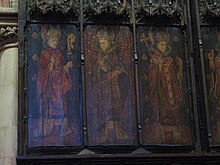Eata of Hexham
| Eata of Hexham | |
|---|---|
| Bishop of Hexham | |

Eata is the central image
|
|
| Appointed | 678 |
| Term ended | 681 |
| Predecessor | Trumbert |
| Successor | John of Beverley |
| Other posts |
Bishop of Lindisfarne (682-685) of Bernicia (678-682) Abbot of Melrose |
| Personal details | |
| Died | 685 or 686 Hexham |
| Denomination | Orthodox Christian / pre-schism Catholic of the Celtic tradition |
| Sainthood | |
| Feast day | 26 October |
Eata (died 26 October 686), also known as Eata of Lindisfarne, was Bishop of Hexham from 678 until 681, and of then Bishop of Lindisfarne from before 681 until 685. He then was translated back to Hexham where he served until his death in 685 or 686. He was the first native of Northumbria to take the bishopric of Lindisfarne.
Eata was originally taken to Lindisfarne as a boy under Aidan and trained as a monk. He was chosen as one of the 12 monks selected from Lindisfarne to found the new daughter monastery at Melrose. In 651 he was elected abbot of Melrose. Around 658 he left Melrose and founded a new monastery at Ripon in Yorkshire, taking with him the young St Cuthbert, who was his guest-master. In 661 King Alchfrith of Deira expelled Eata from Ripon, because he had appointed Wilfrid as the new abbot. Eata returned to Melrose.
The historian Bede described Eata as a gentle and greatly revered man. As an administrator Eata applied his skills at the time of plague, civil disorders and major ecclesiastical change.
In 663 Alhfrith and Wilfrid persuaded King Oswiu to hold the Synod of Whitby to decide whether the local Church, English and Celtic, would come into line with the traditions of the universal Church which had had 6 Oecumenical Synods to date, and would practice the Roman [aka Western] Rite of that Church, or would continue to diverge from it where it clashed with local Celtic traditions. Thus it would decide whether Roman traditions, would take priority in Northumbria over matters such as the clerical tonsure and the date of Easter; the synod decided to accept the arguments of Wilfrid and the king for the universal Church traditions using the Roman Rite, to which Eata, unlike Colmán of Lindisfarne, acquiesced.
...
Wikipedia
